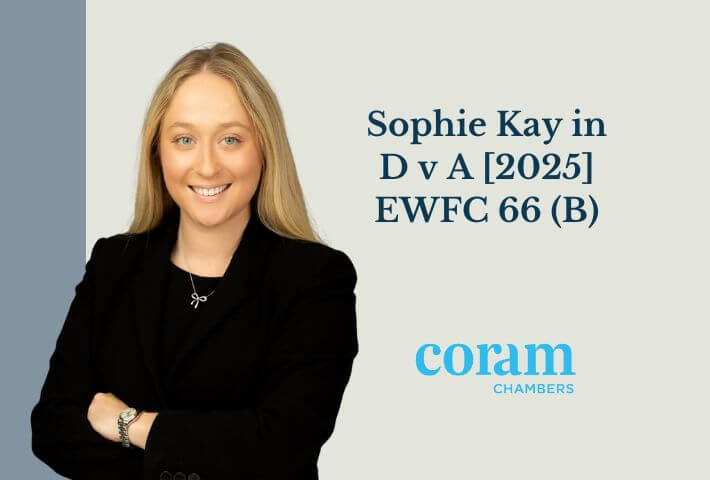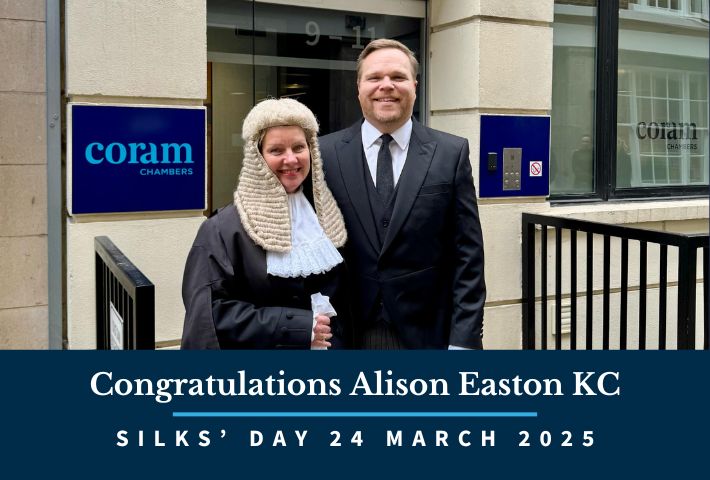After obtaining a first class Honours Degree in History at the University of Leeds, Jake went on to complete the GDL and the BVS, at City Law School, University of London, achieving Distinction. Whilst studying, Jake was awarded the Enoch Dumbetshena and Edmund Davies Scholarships by Gray’s Inn.
Prior to commencing pupillage, Jake worked as an in-house paralegal for a large international education provider as well as with a solicitor’s firm specialising in pensions. He has also been a personal tutor and jobbing musician.
Jake has also volunteered for a number of years with the CCHF charity All About Kids, providing relief to vulnerable children from underprivileged backgrounds. He has also worked as a volunteer with the charity Family Lives, supporting and advising families in crisis and gaining experience across a variety of public and private child law matters.
Jake began pupillage at Coram in October 2022 and commenced tenancy in October 2023. In this article, Jake reflects on a week during his ‘second six’, when he began to take on his own cases and was ‘on his feet’ for the first time.
When I began to take on my own cases and was ‘on my feet’ for the first time. Throughout pupillage and particularly during my ‘first six’ I was encouraged to work between 9am – 6pm only and to ensure that I kept doing all the things that I enjoy in my personal life. Typically, I now work between 8.30am – 6.30pm, depending on the specific requirements of each case. I have quickly come to realise that my work hours ebb and flow – no two weeks are the same and my days off sometimes fall midweek as opposed to the weekend. It has been a big shift moving from shadowing others to appearing in court on my own, but Chambers provides a very supportive environment and pupils are encouraged to ask questions, test ideas and seek advice as much as necessary. From the first day of pupillage, all members, from the newest tenants up to the Heads of Chambers, made a real effort to introduce themselves and give me a warm welcome.
Monday
I receive instructions to appear on behalf of a mother who has made an urgent application for a non-molestation order as well as an application for her children to live with her. The hearing will take place at 10am on Tuesday morning at Romford County Court. The clerks forward me the bundle. I spend a couple of hours reading through the papers and begin to draft my position statement. There are a few issues which I need to clarify so I call the solicitor on the phone, and we have a quick conversation. Once approved by the client, I file the position statement with the court. That evening I attend a talk in Chambers on LSPO applications, followed by drinks with some of the solicitors who attended.
Tuesday
I arrive at Romford County Court at around 8.50am. My client does not arrive until 9.30am. I introduce myself and we find a room at court. The client tells me about an incident which occurred the day before as well as a number of additional incidents which were not included in my instructions nor set out in the papers. We go into court at 10am where the injunction is ordered, and directions are made for witness statements and a Cafcass report to be prepared ahead of the next hearing. After the hearing I debrief with the client and call the solicitor to provide a short update. I then call the clerks to let them know the date of the next hearing. I draft the court order and run it by the other side’s barrister before sending it to the court. I then write up an ‘attendance note’ which I send to the solicitor. I am not in court tomorrow, so I use the time to research the guidance on interviewing child witnesses, as I intend to write an article on the subject over the next few weeks.
Wednesday
I had organised to join my supervisor in East London Family Court for the day but receive instructions that morning for a return hearing on Friday after a without notice non-molestation order was made against my client. I call my supervisor to let them know and they say that I should prioritise my own work and prepare the case from Chambers. I read the papers and file my position statement with the court. I then receive a call from another member of Chambers who asks me to research the circumstances in which the court can overturn findings made against a non-party in previous proceedings. I go to Gray’s Inn library around the corner from Chambers to carry out my research. I prepare my research note and send it to the member of the Chambers.
Thursday
Along with a number of other junior members of chambers, I have been instructed by a local authority to attend and provide updates on a criminal trial involving a family, against whom the local authority is due to bring public children law proceedings. The instructions from the local authority are largely to note the evidence given by the parents. I am sent a link to attend the hearing remotely. The mother is cross-examined, and I take a detailed note of her evidence. After the hearing, I tidy up the note, correcting typos and grammar, before preparing an attendance note. I send both to the local authority solicitor.
Friday
I attend the return hearing at Reading Family Court. I meet my client who is very upset that an order has been made against him on the basis of allegations which he says are untrue. I advise him that the case against him is strong. He tells me that he intends to make an application to see his child, with whom he is not currently having contact. I advise him that if he contests the non-molestation order, he risks findings being made against him at a contested final hearing. I inform the client that one option is to accept the non-molestation order on the basis of no findings or admissions. The client instructs me that he will accept the order on that basis. An order is agreed and sent to the court. When I get back to Chambers, I catch up with some of the junior members before sitting down to begin writing my article.


